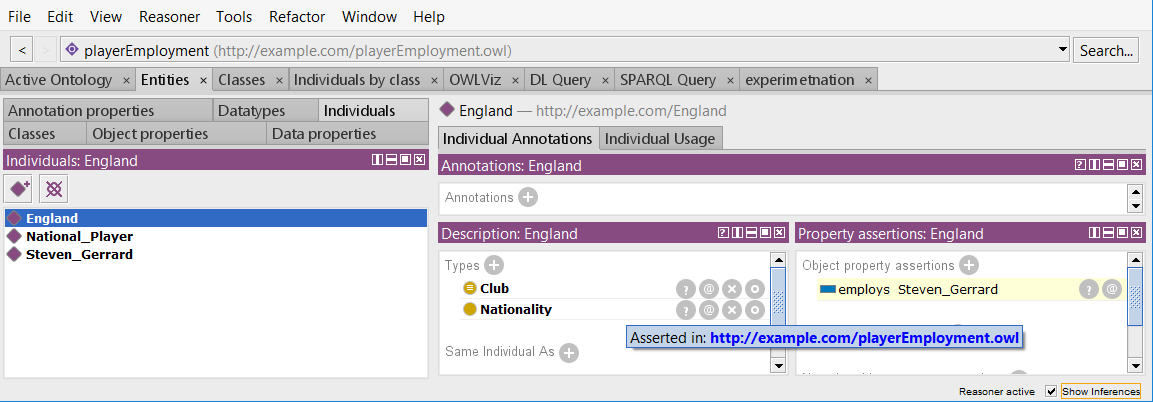I am intrigued by Using Property Chains to get inferred Knowledge in an OWL Ontology(Protege)
The accepted answer has two solutions: two OWL expressions, or a SWRL rule. I get the sense that the OP found the all-OWL (property chain) solution confusing but was satisfied with the SWRL answer.
I am trying to implement the all-OWL solution. So far, I don't see an inference that Steven_Gerrard is employed by England when reasoning with Pellet.
I do see the inference
Steven_Gerrard R_NationalPlayer Steven_Gerrard
Is that an error?
Should I use a different reasoner? The OP got an error from FaCT++.
Is my substitution of
someforvaluesbreaking the reasoning?
The answerer suggested a General Class Axiom of
hasNationalStatus value National_Player EquivalentTo R_NationalPlayer some Self
but Protege compalined about my use of vlaue. It does accept the following:
hasNationalStatus some ({National_Player}) EquivalentTo R_NationalPlayer some Self
- Have I made some mistake in modelling Club, Country and Nationality?
My implementation:
@prefix : <http://example.com/> .
@prefix owl: <http://www.w3.org/2002/07/owl#> .
@prefix rdf: <http://www.w3.org/1999/02/22-rdf-syntax-ns#> .
@prefix rdfs: <http://www.w3.org/2000/01/rdf-schema#> .
<http://example.com/playerEmployment.owl> rdf:type owl:Ontology .
<http://example.com/R_NationalPlayer> rdf:type owl:ObjectProperty .
<http://example.com/employs> rdf:type owl:ObjectProperty ;
rdfs:subPropertyOf owl:topObjectProperty ;
owl:propertyChainAxiom ( [ owl:inverseOf <http://example.com/hasNationality>
]
<http://example.com/R_NationalPlayer>
) .
<http://example.com/hasNationalStatus> rdf:type owl:ObjectProperty .
<http://example.com/hasNationality> rdf:type owl:ObjectProperty .
<http://example.com/Club> rdf:type owl:Class ;
owl:equivalentClass [ rdf:type owl:Restriction ;
owl:onProperty <http://example.com/employs> ;
owl:someValuesFrom <http://example.com/Player>
] .
<http://example.com/NationalStatus> rdf:type owl:Class .
<http://example.com/Nationality> rdf:type owl:Class .
<http://example.com/Player> rdf:type owl:Class ;
owl:equivalentClass [ rdf:type owl:Restriction ;
owl:onProperty <http://example.com/hasNationalStatus> ;
owl:someValuesFrom <http://example.com/NationalStatus>
] ,
[ rdf:type owl:Restriction ;
owl:onProperty <http://example.com/hasNationality> ;
owl:someValuesFrom <http://example.com/Nationality>
] .
<http://example.com/England> rdf:type owl:NamedIndividual ,
<http://example.com/Club> ,
<http://example.com/Nationality> .
<http://example.com/National_Player> rdf:type owl:NamedIndividual ,
<http://example.com/NationalStatus> .
<http://example.com/Steven_Gerrard> rdf:type owl:NamedIndividual ,
<http://example.com/Player> ;
<http://example.com/hasNationalStatus> <http://example.com/National_Player> ;
<http://example.com/hasNationality> <http://example.com/England> .
[ rdf:type owl:Restriction ;
owl:onProperty <http://example.com/hasNationalStatus> ;
owl:someValuesFrom [ rdf:type owl:Class ;
owl:oneOf ( <http://example.com/National_Player>
)
] ;
owl:equivalentClass [ rdf:type owl:Restriction ;
owl:onProperty <http://example.com/R_NationalPlayer> ;
owl:hasSelf "true"^^xsd:boolean
]
] .


Steven_Gerrard R_NationalPlayer Steven_Gerrardisn't incorrect. The point of theR_NationalPlayeris that it relates each NationalPlayer to itself, right? So Steven_Gerrard should be related to Steven_Gerrard. – Inquisitive:Steven_Gerrard :hasNationalStatus :National_Player>and then the class equivalence axiom where the left-hand side exactly matches a1. As Josuhua said, the right hand side exactly expresses that:Steven_Gerrardis connected to himslef by the property:R_NationalPlayer– Esotropia